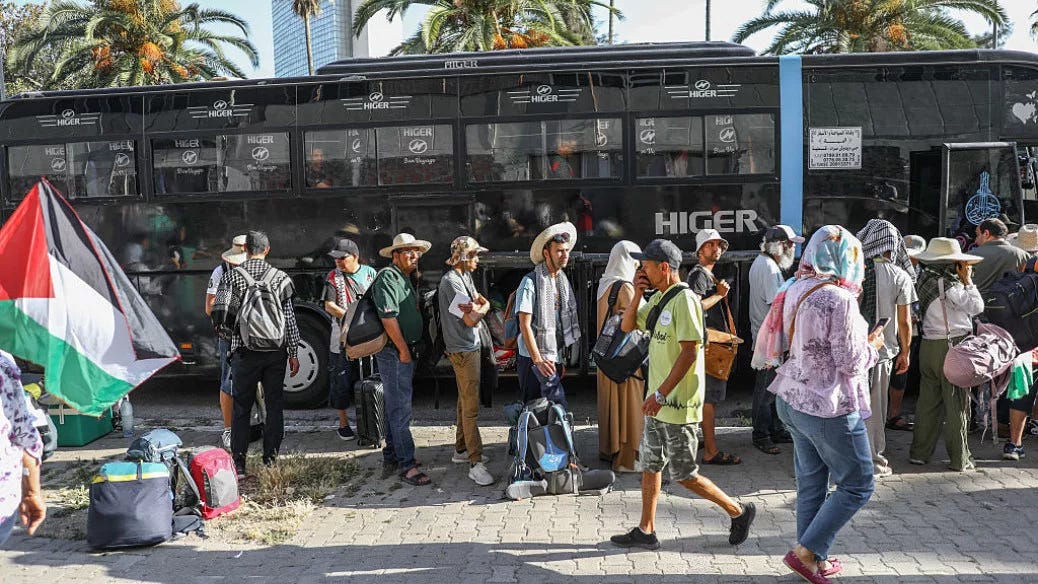In recent times, Egyptian regime‑aligned media outlets have been quick to brand campaigns like the “Convoy of Steadfastness”—which traveled from Tunisia to Egypt, aiming to stage a sit‑in at Rafah crossing—as treacherous. This came in parallel with the planned “Global March for Gaza,” expected to begin from Cairo.
These media arms criticized and sought to suppress the initiatives, arguing that they threaten Egyptian national security. But how has the Egyptian regime, since 2013, wielded the concept of national security—molding it to suit political necessities—to silence dissent?
Conspiracies by the “people of evil”
In authoritarian states, regimes direct public attention toward a constructed threat—internal or external—whichever best suits their narrative and the moment’s political circumstances.
In Egypt, following President Sisi’s ascent in 2013—a shift that ushered in a unique, harshly authoritarian era—his speeches, amplified by security‑controlled media, began echoing a singular narrative: the nation was in a state of exception, under constant threat from the “people of evil” who sought to undermine Egyptian national security.
Here, “evil” was synonymous with the Muslim Brotherhood, the regime’s principal adversary, banned and designated a terrorist organization. Cultural and media spaces—clamped down by the security forces—repeated refrains warning of terrorism, its financiers, and perpetrators, allegedly plotting to destabilize the nation.
This narrative justified the assassination, detention, and disappearance of tens of thousands of Egyptians, with rights violations carried out under the pretext of national security.
The rise of real armed insurgencies—most notably ISIS‑affiliated Wilayat Sinai—in North Sinai and elsewhere intensified the official fear narrative, reinforcing in public consciousness that an existential threat loomed. It bolstered an extraordinary state of emergency and repression that remains entrenched today.
The global conspiracy against Egypt
This discourse persisted until the Al‑Aqsa flood—a turning point that brought a new phase. Relaunched after October 7, as Israel prepared to empty Gaza and displace Palestinians to Sinai, a new national‑security narrative took shape.
President Sisi publicly opposed such displacement during a press conference on October 18, 2023, held in Cairo with the German Chancellor, framing the protection of Palestinians as an Egyptian security interest.
In tandem, the regime intensified repression: arresting protesters advocating ceasefires, aid access, and opposing forced displacement—typically under charges like “supporting terrorism” or “undermining national stability.” This newly defined notion of “national security” stigmatized dissent as existential threats to the state.
Egyptian media, under the security services’ direction, shifted tone at will—some days condemning Hamas for the October 7 attacks, others condemning Israeli violence, always aiming to align with regime positioning, internationally and domestically.
No voice above the official narrative
This securitized narrative became most visible in recent weeks, when the Tunisian‑launched Convoy of Steadfastness headed toward Egypt to protest at Rafah crossing. Before its interruption in Benghazi, media outlets and regime spokespersons dismissed it as subversive claiming thousands of participants, questionable legal entry, and risk of “foreign agents” igniting unrest.
The “Joint Action Coordination for Palestine,” which organized the convoy, responded that they had submitted the necessary paperwork to Cairo and received no reply—suggesting deliberate administrative blockage.
Central to regime arguments was the amplified “internal security risk” from uncontrolled mass entry—foreign agitators deemed capable of provoking local instability, especially near Rafah juxtaposed against Israeli enforcement.
When some activists did arrive at Cairo airport to join either campaign, authorities detained dozens, deporting them in demeaning manners—some incidents documented on video. Others reaching Rafah were intercepted in Ismailia by security forces, held briefly on city streets, investigated, and ultimately deported.
Cairo security units also raided hotels and apartments housing global campaigners, arresting dozens before deporting them. Even manifest organizers like Sief Abu Kashk, the Global March spokesperson, were detained—briefly held, then released.
Thus, much of June in Egypt has been defined by forceful suppression: detention, harassment, and deportation of those standing in solidarity with Gaza or aiming to bring humanitarian aid.



